Pages
Installing Love
Tech Support: Yes, .. how can I help you?
Customer: Well, after much consideration, I've decided to install Love. Can you guide me through the process?
Tech Support: Yes. I can help you. Are you ready to proceed?
Customer: Well, I'm not very technical, but I think I'm ready. What do I do first?
Tech Support: The first step is to open your Heart. Have you located your Heart?
Customer: Yes, but there are several other programs running now. Is it okay to install Love while they are running?
Tech Support: What programs are running?
Customer: Let's see, I have Past-Hurt.exe, Low-Self-Esteem.exe, Grudge.exe and Resentment.exe running right now.
Tech Support: No problem, Love will gradually erase Past-Hurt.exe from your current operating system. It may remain in your permanent memory but it will no longer disrupt other programs. Love will eventually override Low-Self-Esteem.exe with a module of its own called High-Self-Esteem.exe. However, you have to completely turn off Grudge.exe and Resentment.exe. Those programs prevent Love from being properly installed. Can you turn those off?
Customer: I don't know how to turn them off. Can you tell me how?
Tech Support: With pleasure. Go to your start menu and invoke Forgiveness.exe. Do this as many times as necessary until Grudge.exe and Resentment.exe have been completely erased.
Customer: Okay, done! Love has started installing itself. Is that normal?
Tech Support: Yes, but remember that you have only the base program. You need to begin connecting to other Hearts in order to get the upgrades.
Customer: Oops! I have an error message already. It says, "Error - Program not run on external components" What should I do?
Tech Support: Don't worry. It means that the Love program is set up to run on Internal Hearts, but has not yet been run on your Heart. In non-technical terms, it simply means you have to Love yourself before you can Love others.
Customer: So, what should I do?
Tech Support: Pull down Self-Acceptance.exe; then click on the following files: Forgive-Self.txt; Realize-Your-Worth.txt; and Acknowledge-Your-Limitations.txt.
Customer: Okay, done.
Tech Support: Now, copy them to the "My Heart" directory. The system will overwrite any conflicting files and begin patching faulty programming. Also, you need to delete Verbose-Self-Criticism.txt from all directories and empty your Recycle Bin to make sure it is completely gone and never comes back.
Customer: Got it. Hey! My heart is filling up with new files. Smile.mpg is playing on my monitor and Peace.txt and Contentment.txt are copying themselves all over My Heart. Is this normal?
Tech Support: Sometimes. For others it takes awhile, but eventually everything gets it at the proper time. So Love is installed and running. One more thing before we hang up. Love is Freeware. Be sure to give it and its various modules to everyone you meet. They will in turn share it with others and return some cool modules back to you.
Customer: I will. Thank you for your help.
Godly Play
"I'd rather spend more time with my parents than go out shopping at the weekend", (local child, aged 9).
A couple of days ago I returned to one of the things I used to really love about being a parish priest - story-telling with primary school children.
A small group of us went into a local school and told the story of the Creation. We were using the Godly Play technique (Montessori-style tactile learning).
We sat on the floor in a circle and using some very basic, but well made, cut-outs we ran through the ancient story from Genesis 1 of God's gift of Creation, 'In the beginning.... On the first day... On the second... And God saw that it was all very good'.
The great thing about Godly Play is the way that over a dozen kids can sit still for nearly 30 minutes completely entranced by the meditative unfolding of a simple story. When I tell a story like this, it often feels a bit like celebrating a Eucharist there is such intensity and reverence in the room.
What's even more exciting is that after the story-telling proper, the circle is encouraged to 'wonder' about the story. Instead of old-style chalk and talk Religious education (RE), Godly Play is both faithful to the Bible texts, but also completely open to allow children to discover what the texts mean for them. It's a remarkable post-modern approach to RE.
As part of our wondering I played at removing various of the seven 'days' and asking the children what they felt. Several of the children wondered whether if the 'seventh day', the 'day to rest and remember', were removed from a week, people's bodies and minds would begin to break down. One lad suggested it might lead people to commit suicide.
In one of the other groups a similar question led one child to make the comment I began this entry with: s/he'd rather spend time with family on a Sunday than have another day out shopping with mum and dad. And all this, just as the Government's Department of Trade and Industry considers extending Sunday trading hours...
More info about Godly play and other links on this blog entry here.
Singin' Bout the Revolution
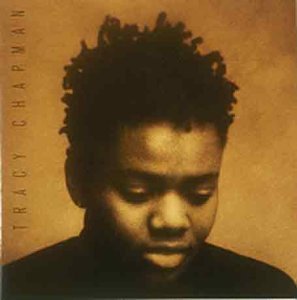
On a car trip to visit friends we rediscover Tracy Chapman. Several of the tracks from her debut album are stunningly good, especially for the liberation-theology minded:
Why? (1986) (Clip here).
Why do the babies starve
When there's enough food to feed the world
Why when there're so many of us
Are there people still alone
Why are the missiles called peace keepers
When they're aimed to kill
Why is a woman still not safe
When she's in her home
Love is hate
War is peace
No is yes
And we're all free
But somebody's gonna have to answer
The time is coming soon
Amidst all these questions and contradictions
There're some who seek the truth
But somebody's gonna have to answer
The time is coming soon
When the blind remove their blinders
And the speechless speak the truth
and
Talkin' Bout A Revolution (1982) (Clip here).
Don’t you know
They’re talkin’ bout a revolution
It sounds like a whisper
Don’t you know
They’re talkin’ about a revolution
It sounds like a whisper
While they’re standing in the welfare lines
Crying at the doorsteps of those armies of salvation
Wasting time in the unemployment lines
Sitting around waiting for a promotion
Poor people gonna rise up
And get their share
Poor people gonna rise up
And take what’s theirs
Don’t you know
You better run, run, run...
Oh I said you better
Run, run, run...
Finally the tables are starting to turn
Talkin’ bout a revolution
Album here.
Why 'heresy' is now 'opinion'
 In his portrait of the Reformer John Calvin, William Bouwsma makes the important observation that a fundamental shift has occurred since the sixteenth century in the philosophy of epistemology (or, how we think we know something).
In his portrait of the Reformer John Calvin, William Bouwsma makes the important observation that a fundamental shift has occurred since the sixteenth century in the philosophy of epistemology (or, how we think we know something).A difference of opinion in the sixteenth century among theologians, like Calvin, might have led to charges of willful and dangerous heresy and punishment by death. Today such a theological difference of opinion may be allowed on the basis of the possibility of alternative interpretations.
This shift does not lie merely in the extension of a 'civilized' culture or in changes in law, or social values. It is due to a deeper move:
'Fundamental to traditional culture was a confidence that the human mind is capable of knowing what exists as it really is: as God might know it... The mind is united and becomes identical with what is known. Aristotle had said this directly: "The act of knowing is the same as the thing known."
In this conception of knowing, the role of the knower is passive: the active role in the union of knower and known is played by the object, which impresses itself on the mind.
This conception might be contrasted with the modern notion of thinking about a thing, a notion that assumes a distinction between thought and its object and recognizes the possibility of wide discrepancies between them.
The traditional conception was ... absolutist and authoritarian. If our knowledge is of things themselves as they really are, there should be, in principle, no disagreement.Difference of opinion in matters of knowledge could only be construed as resulting from deficiency of mind or from perversity: a difference of opinion stubbornly maintained would, from this standpoint, be wicked.
In any case the truth about things, especially in important matters, must be made to prevail. This position could lead to charges of heresy not only in religion but also in the natural sciences or even history.'
John Calvin, A Sixteenth Century Portrait, pp. 69-70.
Other ways of speaking salvation?
I am in a foul mood. A little depressed, withdrawn, edgy, suspicious, tired.
My wife comes to me and I snap at her.
She does not respond by snapping back. She offers me a drink and a chocolate biscuit.
In a sudden, I am overwhelmed by her grace in the face of my behaviour. She doesn't deserve my ill temper.
My realization changes me. In graciously giving of herself, my negativity is absorbed. In an instant I am saved and restored.
I notice similar transformations involving everyday grace. Here's another:
My toddler guilelessly joins in the circle we form around the communion table in Church. I pick him up.There are many biblical models for salvation and atonement, all of them inadequate on their own. One of them almost comes close to this - Abelard's idea that the free self-giving of God in Christ overwhelms us and transforms us.
He comments without any concern for others' opinions that there is bread and wine being handed around. When it comes to him he holds out his hand, too.
His presence brings smiles to other faces. The mood of the circle is lifted.
Why? It is, I think, because of the grace of the gift of himself to us. His unconcern for himself - his living his life without calculation - brings a glimpse of grace.
We see him, just briefly, as a gift. And that glimpse momentarily transforms those of us around him who witness it.
(There's a touching example of this 'economy of grace' triumphing over the 'economy of hatred' right at the moment of the crucifixion. A Centurion who sees the way Jesus dies - his treatment by others and his refusal to respond with hatred - is in that moment converted: 'Truly this man is the Son of God'.)
Often though such a 'moral example' theory puts the emphasis on us to choose to respond to grace, and that is its weakness: that it is too 'subjective'.
My experiences described above though involve no moments of calculated choice. I am simply overwhelmed by grace, I have no choice in the matter at all.
The Church has never given its approval to any particular theory of salvation. None of the early Creeds focused on it. Pragmatically speaking every theory is a rhetorical construction of its age whose aim is to help us recognize our salvation for ourselves.
What would the rhetoric of salvation look like today if it traded on twenty-first century experiences, anxieties and dreams?
Generous answers on a post card...
'...he is not here.'
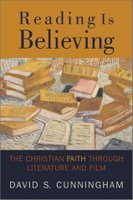 A final quote from David Cunningham's book Reading is Believing, an introduction to the Apostles' Creed via the writings of Iris Murdoch, P. D. James, Dickens, Shakespeare, Toni Morrison, Barbara Kingsolver and others.
A final quote from David Cunningham's book Reading is Believing, an introduction to the Apostles' Creed via the writings of Iris Murdoch, P. D. James, Dickens, Shakespeare, Toni Morrison, Barbara Kingsolver and others.Writing about the sixth article of the Apostles' Creed ('...he ascended into heaven'), Cunningham makes the surprising assertion that our faith is superior to that of the original witnesses of the Resurrection.
'Since Jesus is not here [any longer after the Ascension] as a single, fully human, fully enfleshed being, this implies that our Christian faith is not compelled by God. God does not force us to believe by means of a physical presence that would, as it were, quiet all our doubts.
Our freely given faith is, in some sense, superior to the faith of those who, like Thomas, seemed to have little choice in the matter. (In John 20:29, Jesus says, "Have you believed because you have seen me? Blessed are those who have not seen and yet come to believe.")
The physical presence of another person is an overwhelming experience; no longer does our relationship to that person require much action or initiative on our parts. We are almost compelled to acknowledge the existence of the other by that person's sheer physical presence.
In that person's absence, our faith and love are put to the test; now it will require an act of our own will, a determined decision, to bring the other person to mind, and to place our trust and devotion there. Our belief in the ascension of Jesus is a sign and seal of the depth and breadth of our faith.'
Cunningham on the Resurrection
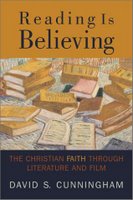 A little early perhaps considering it is still Maundy Thursday, but still...
A little early perhaps considering it is still Maundy Thursday, but still...An excerpt from Cunninghams's treatment of the fifth article of the Apostles' Creed, '...On the third day rose again...'.
'The resurrection of Jesus ... is, above all, an authentication of the life of Jesus: a claim that God officially approves of his teachings and his willingness to die at the hands of the state.
The particular form of Jesus' life and death is thereby described as a good form, a divinely sanctioned form.
In addition, the resurrection of Jesus makes a statement about suffering and death--namely, that death does not have the final word. God's mighty act of raising Jesus from the dead is, as Paul puts it, a defeat of death by death (1 Cor. 15:54). "Death no longer has dominion over him" (Rom. 6:9); and, by extension, death no longer has dominion over us.'
Reading is Believing (p. 102).
The Maze of Faith
Manchester Passion
Kick off for this live event is: 9.00pm Good Friday BBC3. It will last about an hour you can go see it live in Manchester, too...
Full set list:
Jesus sings You're Gonna Need Someone On Your Side (Morrissey)
Mary sings Cast No Shadow (Oasis)
Jesus sings Love Will Tear Us Apart (Joy Division) at the Last Supper.
Mary sings Search For A Hero (M People)
Judas sings Heaven Knows I’m Miserable Now (The Smiths) as he is about to betray Jesus.
Jesus sings Sit Down (James) to the sleeping disciples
Jesus and Judas sing Blue Monday (New Order)
Peter sings I Am The Resurrection (The Stone Roses) when he betrays Jesus
Mary sings Angels (Robbie Williams)
Jesus and Pontius Pilate sing Wonderwall (Oasis)
Mary sings Sunshine After The Rain (Elkie Brooks)
Full details here and here
'...suffered under Pontius Pilate'
 Excerpt from David Cunningham's Reading is Believing on the fourth article of the Apostles' Creed (p. 83).
Excerpt from David Cunningham's Reading is Believing on the fourth article of the Apostles' Creed (p. 83)."The Biblical texts tells us that Jeus suffered from hunger (Matt. 4:2), from loneliness (Matt. 26:40), from frustration (Mark 8:21), from anger (Mark 3:5), and from a feeling of abandonment (Mark 15:34).
The writers of the creed could also have emphasized his sufferings under the religious authorities of his day, or at the hands of his compatriots. But by focusing on Pilate (and therefore on the Empire), the creed draws our attention to the temporal power structures that seek to dominate our lives.
These structures may be political, economic, familial, or cultural; they may draw their strength from illegitimate appeals to difference in race, gender, and other biological realities; and they may achieve their dominance through violent coercion, subtle suggestion, or the incitement of mass panic.
Of course human suffering is not limited to these particular forms, but neither should we forget that much of our suffering results from structures that are put in place by human beings.
The creed emphasizes that Jesus suffered under some of the same forms of domination that we suffer under today."
Review of 'This Thing of Darkness'
As is well known, Darwin's time on board the Beagle furnished him with the material to compose his theory of evolution by natural selection. What Harry Thompson's impressively researched, lightly-told and frequently humorous book does, too, is to reveal the many other stunningly impressive scientific advances her crew made and the acts of heroism these involved.
Against the background of powerful natural and human adversity, under its inspirational and at times mercurial Captain, this tiny vessel's crew made incredible discoveries in disciplines as diverse as navigation, geology, anthropology, botany and meteorology.
But this thrilling novel is not just about external journeying. The 'thing of darkness' to which the title alludes refers not just to the illumination of previously unknown geographical, or even intellectual, information. We are party, also, to the exploration of the darker recesses of the human person.
Thompson makes us witnesses to the ill effects of human greed, ignorance and (with great pathos) naive idealism. And he does this with nods to the present which are, by turn, wry, poignant and savagely critical. It is these recurring allusions to the present that make this novel transcend the genre of nautical yarn and lift it to the status of modern-day parable.
Colonizing settlers are thus shown exterminating native 'terrorists' and justifying their deeds with words and sentiments cleverly borrowed by the author from George Bush and Tony Blair's 'War on Terror'. The aftermath of a tsunami is vividly rendered with descriptions reminiscent of recent news footage. The tale of an experiment to civilize Patagonian natives ultimately risks personal and tribal disaster, and a comment about modern globalization and its effects on ecologies and cultures can clearly be heard as an echo.
Throughout this, though, there is also an on-going exploration into the way scientific and religious arguments interact. Here the writer does not simply re-enact before us the clash and sparks of abstract thought, but more movingly lays bare their effect upon the darker places of the human personalities who think them. This is a tale at whose heart are two very unique individuals, whose personalities and beliefs are initially complementary, but finally irreconcilable.
In the context of the present debate about Creationism, Intelligent Design and Neo-Darwinianism which has in recent months touched schools, courtrooms, archiepiscopal pronouncements and even recent episodes of West Wing, this novel is not only viscerally gripping, but also intellectually and emotionally engrossing.
There is an ironic and final pathos about This Thing of Darkness. It was both its young author's first and last novel. Harry Thompson succumbed to his own encounter with natural selection in the form of lung cancer. It was not before he was aware though that his brilliant novel had been long-listed for the Booker Prize. A superb beach novel, particularly if that beach is a raised one, five thousand feet up in the Andes, and littered with fossils.
(c) M.Laynesmith, 2006.
'Amen'
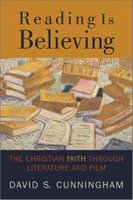 Cunningham ends his series of literary reflections on the Apostles' Creed by noting the presence of the final word: 'Amen':
Cunningham ends his series of literary reflections on the Apostles' Creed by noting the presence of the final word: 'Amen':'...creeds are not mere laundry lists of statements about the Christian faith. In fact they are really much more like prayers. When we say them, we are not merely announcing what we think or describing the state in which we find ourselves; we are also asking God for help and guidance in living into the faith that the creeds attempt to articulate. We are confessing our faith, but we are also confessing our unfaith...
...Our tendency to inhabit the borderlands between faith and unfaith is not new. It is not merely a recent development brought on by life in an increasingly secular age. In fact, it has been typical of the way that people have responded to the gospel of Jesus Christ through the ages....
...In his Confessions, Augustine offers a wonderful description of the long and arduous path[,] that he wandered through the equally attractive lands of faith and of doubt until he finally came to realize that "our hearts are restless until they rest in God." And what Christian has not been beguiled by the beautiful story in the Gospel of Mark, in which the father of the sick child is told that all power and possibility is dependent upon his ability to believe? He cries out to Jesus, as would we all, "I believe; help my unbelief"...
...Perhaps these stories [quoted in the previous chapters] can even help transform our perception of the Apostles' Creed (and other statements of Christian belief) from a suspiciously antiquated checklist of beliefs in to a heart-felt and life-transforming prayer--a prayer that we can utter in the spirit of a bereaved parent who cries out, "I believe; help my unbelief!" and a prayer to which we can, with confidence and joy, say "Amen."'
(Reading is Believing, pp. 235-6)
A Missed Academic Career
"You scored as English. You should be an English major! Your passion lies in writing and expressing yourself creatively, and you hate it when you are inhibited from doing so. Pursue that interest of yours!
English - 83%
Linguistics - 75%
Anthropology - 75%
Philosophy - 67%
Journalism - 67%
Psychology - 67%
Sociology - 67%
Engineering - 63%
Theater - 50%
Mathematics - 50%
Biology - 42%
Art - 33%
Chemistry - 33%
Get ready for it - the Gospel of Judas!
Sadly, in the journalistic hype the overlooked details of this case are plentiful and significant. Hardly 'unknown' the text has been known about for decades (although not translated). It isn't a complete text. The manuscript itself dates to around 300. The text it contains was possibly written up to a century after the New Testament Gospels - and not by Judas. And it fits perfectly with other Gnostic texts in its complete lack of interest in the real physicality and historicity of Jesus.
I can already hear the sound of money pouring into publishing bank accounts... and the equally load groans of boredom from the poor sods who buy the thing expecting a STUNNING NEW REVELATION about the REAL JESUS who MARRIED MARY MAGDALENE!
Well sorry, no such luck.
Turns out the early church was pretty discerning in what it decided constituted a good account of the life and significance of Jesus, and what was just away with the faeries... (ok, not fair on gnostics - the text is another useful insight into second century gnostic belief, I should aim my frustrations as the publishers)
The more interesting story is the manuscript's journey through the black market and the attempt to flog it for $10 million. Thankfully the views of genuine scholars are slowly reaching the press (although always just too late...).
Speaking personally I've always been extremely moved by Judas' tragic story and his repentance by suicide. Judas is scarcely more hostile to Jesus than Peter denying his friend outside the High Priest's house. I blame Dante for popularizing the image of Judas frozen in the devil's mouth in the depths of hell.
For the interested a quick sample:
Judas said, “Master, as you have listened to all of them, now also listen to me. For I have seen a great vision.”
When Jesus heard this, he laughed and said to him, “You thirteenth spirit, why do you try so hard? But speak up, and I shall bear with you.”
Judas said to him, “In the vision I saw myself as the twelve disciples were stoning me and [45] persecuting [me severely]. And I also came to the place where […] after you. I saw [a house …], and my eyes could not [comprehend] its size. Great people were surrounding it, and that housea roof of greenery, and in the middle of the house was [a crowd—two lines missing—], saying, ‘Master, take me in along with these people.’”
[Jesus] answered and said, “Judas, your star has led you astray.” He continued, “No person of mortal birth is worthy to enter the house you have seen, for that place is reserved for the holy. Neither the sun nor the moon will rule there, nor the day, but the holy will abide there always, in the eternal realm with the holy angels. Look, I have explained to you the mysteries of the kingdom [46] and I have taught you about the error of the stars; and […] send it […] on the twelve aeons.”
Nice change to find a laughing Jesus, though.
For those who want a more extensive free peek, or a look at some of the surrounding press comments.
Reading is Believing
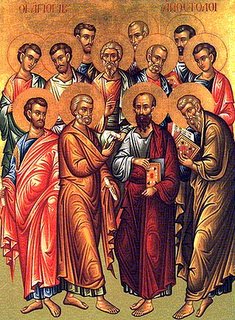 David Cunningham has been a recent discovery over the past few years for me, beginning with his These Three Are One, one of the most accessible and relevant books on Trinitarian theology I've ever come across. (How often do you find a theology tome that includes words for a new hymn?).
David Cunningham has been a recent discovery over the past few years for me, beginning with his These Three Are One, one of the most accessible and relevant books on Trinitarian theology I've ever come across. (How often do you find a theology tome that includes words for a new hymn?).Cunningham has a profound interest in the reception of theological doctrine, not just its formation (see his Faithful Persuasion).
This work, Reading is Believing, sees him trying to explore the Apostles' Creed for the general laity in the form of a book/film-club.
Interesting idea; I've just finished his section on the incarnation which (rightly) cooks a snoop at unwitting modern Christian docetism by holding up The Last Temptation of Christ as a profound meditation on Jesus' full humanity.
I'll post the best bits (as I see them). But to start with I loved his charming advert to the legendary origins of the Apostles' Creed:
Apparently, so the story goes, it began with the 12 disciples (Matthias replacing Judas) sitting together when Peter pipes up, 'I believe in God the Father almighty, creator of heaven and earth...', to which Andrew adds, 'And in Jesus Christ, God's only son, our Lord'.
I fondly imagine each apostle pitching in one at a time with their reflections. Most poignant of all, to whom is the fifth article of the creed ('Descended into hell, on the third day rose again from the dead') ascribed in the legend? Why, who else but that great doubter: Thomas.
The Last Week
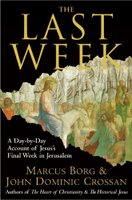 This looks fascinating - but can it be any more gripping than the original?
This looks fascinating - but can it be any more gripping than the original?The publisher's blurb reads:
"Using the gospel of Mark as their guide, Borg and Crossan present a day-by-day account of Jesus's final week of life. They begin their story on Palm Sunday with two triumphal entries into Jerusalem. The first entry, that of Roman governor Pontius Pilate leading Roman soldiers into the city, symbolized military strength. The second heralded a new kind of moral hero who was praised by the people as he rode in on a humble donkey. The Jesus introduced by Borg and Crossan is this new moral hero, a more dangerous Jesus than the one enshrined in the church's traditional teachings."
And the Winner is...

Sally has announced the winner of the Chaplaincy sweepstakes on the stats for our new baby! Thanks Sally. The winners get to change a nappy each.
April Fools

I'm always falling for these. Perhaps I just take life too seriously.
My two favourites were the news about the
first woman archbishop
and this hilarious one about an really creative
alternative worship event.
Lost in Wonder for Steam

My toddler and I went to see a model steam railway this afternoon. What things of glory these hand-built engines are - beautiful craftsmanship. Each costs several tens of thousands of pounds.
Fascinating, too, that most of the people young and old were boys/men (the only women I really noticed were talking about how to keep the club house well maintained - obviously the ones with real responsibility!).
 Meanwhile James - and I - were mesmerised and lost in wonder. How did a fondness for little steam engines get in our genes? It certainly goes deep...
Meanwhile James - and I - were mesmerised and lost in wonder. How did a fondness for little steam engines get in our genes? It certainly goes deep...
Submissive wives no more!
Dave (a UCCF worker with the Christian Union in Reading University) keeps a blog. His recent thoughts on 'wives submitting to husbands' (according to some readers of the Letter to the Ephesians) provoked me to reach for the Greek New Testament and a few commentaries.
Having often heard Conservative Evangelicals trot out the 'wives should submit to their husbands' line, I was pleasantly surprised to learn what the Bible really says.
The (mis)quote comes from Ephesians ch.5.
Several observations can be made:
1) The author begins by stating that every Christian should 'submit' to every other Christian. This envisages the creation of a sort of love communitarianism with the intention of countering any one individual's pride. 'Submission' is thus a general ethic (according to the writer) and not a vocation merely for Christian wives.
2) Most surprising of all is that the earliest Biblical manuscripts (dating to around 200 AD) don't have the phrase 'wives submit to your husbands' at all. The verb is missing (only added by latter copyists). Whenever the phrase is used by modern preachers it is - at best - misleading as it is hopelessly out of context, or - at worst - simply 'unbiblical' (to use an evangelical phrase).
3) An ethic of 'submission' is, however, still present in the passage. What the writer seems though to be getting at when it comes to how husbands and wives should treat each other is a matter of mutual deference. Submission by one partner to the other is to be perfectly balanced by the surrender of the other to the wishes of the first...
All very abstruse. But a relief to be able to rehabilitate that part of the Bible.
'Pass the chocolate, dear, and make me a cup of coffee will you... ouch! ... Ok, I'll do it myself - want one, too?'
With thanks to Dave for prompting these reflections and to John Muddiman's commentary on Ephesians. The full exchange of views can be seen here.



